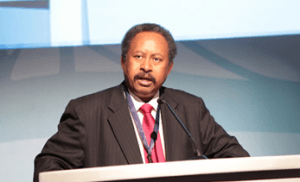Half of Africans would continue to live without electricity by 2030 unless… – Hamdok

As Africa’s population grows, demand for energy is on the increase and the continent must find ways to meet the demand, Abdalla Hamdok, the Deputy Executive Secretary of the UN Economic Commission for Africa (ECA) has said.
Speaking at the opening of the African Energy Ministers and Pan African Investment Forum in Addis Ababa November 12, 2012, the senior UN official warns that unless bold and effective measures were taken now, half the African population would continue to live without electricity by 2030, according to a statement issued by the ECA.
Mr Hamdok believes that as Africa continues to register remarkable economic growth with an average of 5% GDP rate per annum, and with six out of the ten fastest growing countries in the world today, the growing demand for energy on the continent needs urgent and alternative solutions.
Mr Hamdok told the meeting that 25% of the African population has access to modern electricity as compared to 50% in South Asia and more than 80% in Latin America.
The continent’s efforts, Hamdok has observed, are still geared towards investing in fossil and hydro-based electric generation and as a result, “other alternative sources of energy such as wind, solar and bio mass resources have been overlooked”.
According to the ECA statement, Hamdok who made a case for investment in renewable energy sources noted they [renewable energy] are well suited to rural areas, particularly where the national grids are less accessible. “In such areas, abundantly available energy sources such as off-grid and stand-alone solar and wind power could meet the needs of localized areas,” he said.
He further stated that renewable energy is a domestic resource and as such, provides alternatives to uncertain and increasingly expensive imports of fossil fuels which according to him, “often puts African economies at the mercy of foreign and volatile supply chains.”
He told the forum that renewable energies open a new export opportunity by generating revenues in much needed hard currency through carbon crediting on the international carbon market.
He suggested that increase in domestic public investment is needed as “no external sources can ever address all the continent’s power needs.”
He recommended improving utilities’ corporate standing and creditworthiness as it would earn companies the advantage of accessing resources directly from the various capital markets.
By Ekow Quandzie

I am surprised that no mention is made of the Private Secto role in this article. I don’t know if this is due to the fact that Mr. Hamdok failed to mention it or not. As a person who spent over 25 years developing, constructing and operating Independent Power Projects all over the world I would like to suggest African countries put in place the necessary legal framework to attract the huge private money available in the international market place. Africa with a population of about 1 Billion has Power generation capacity about 50% of California, a state of only 40 million people.